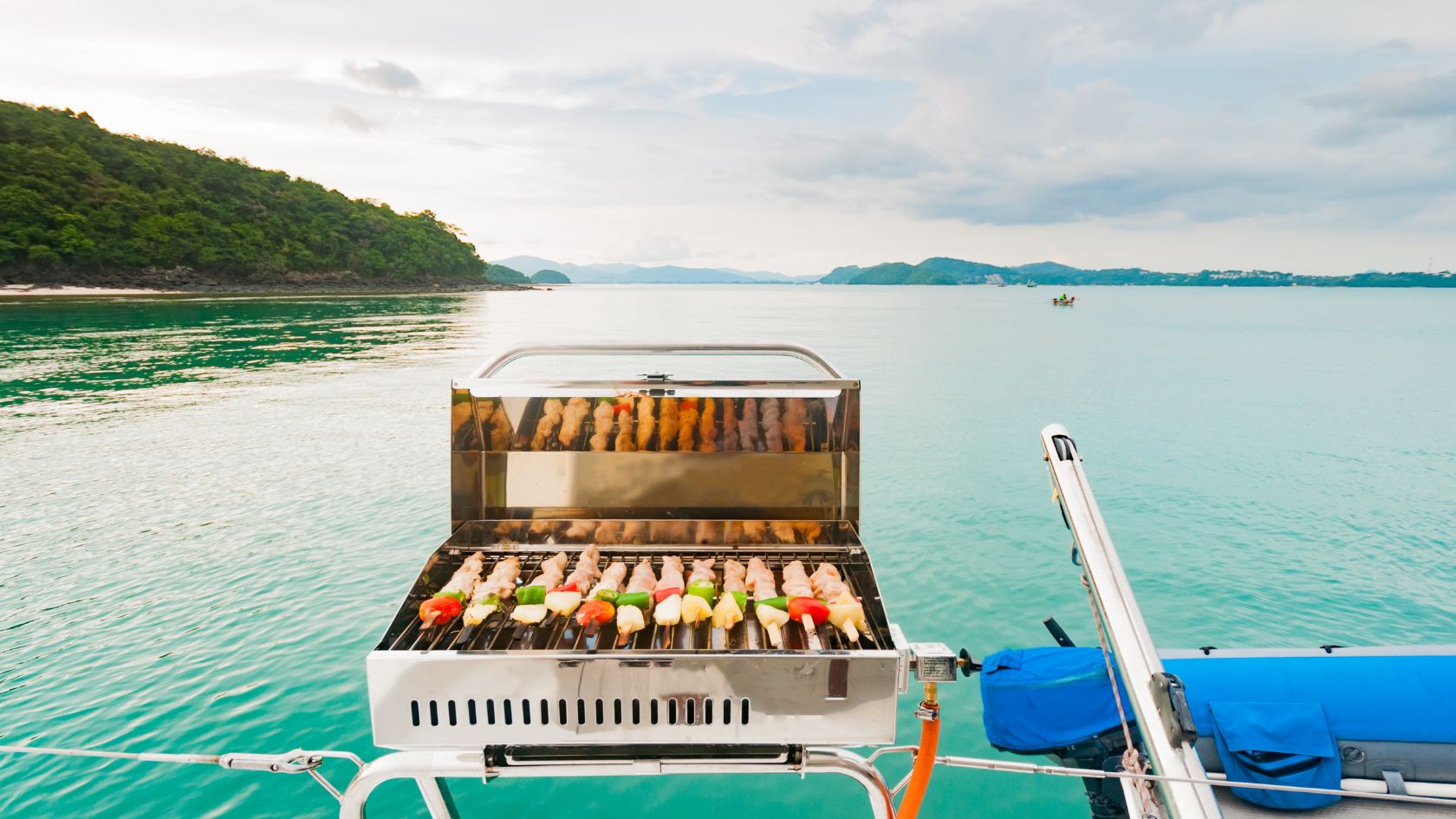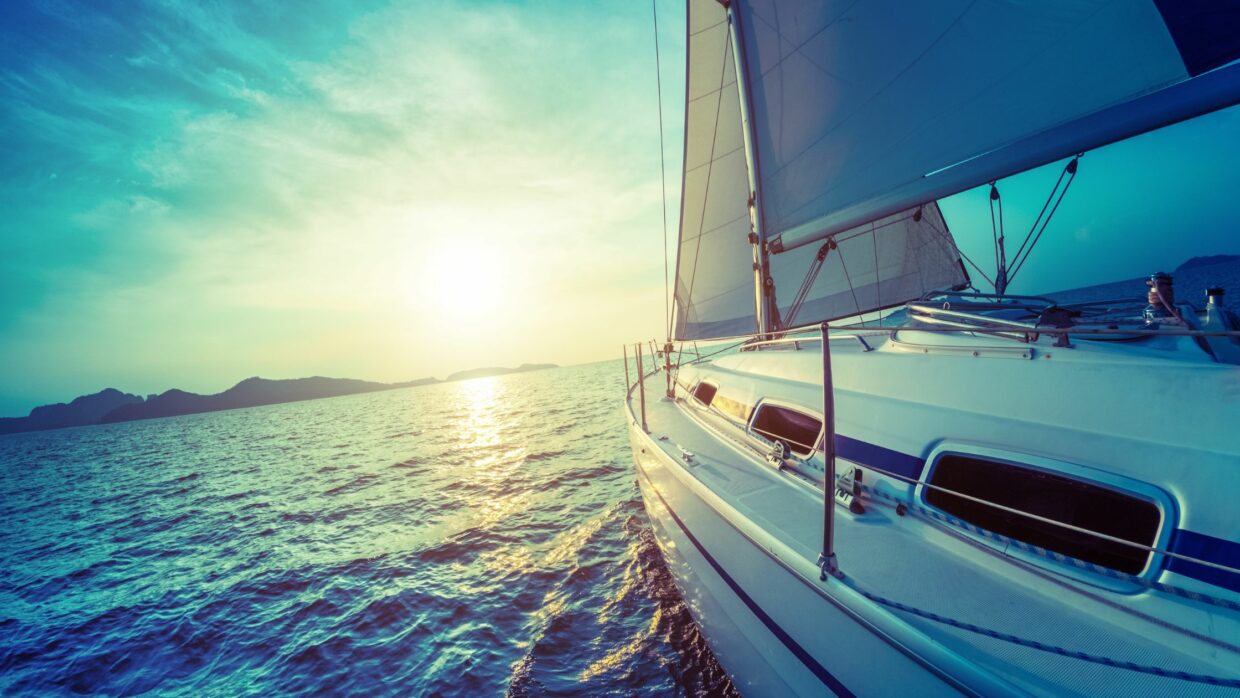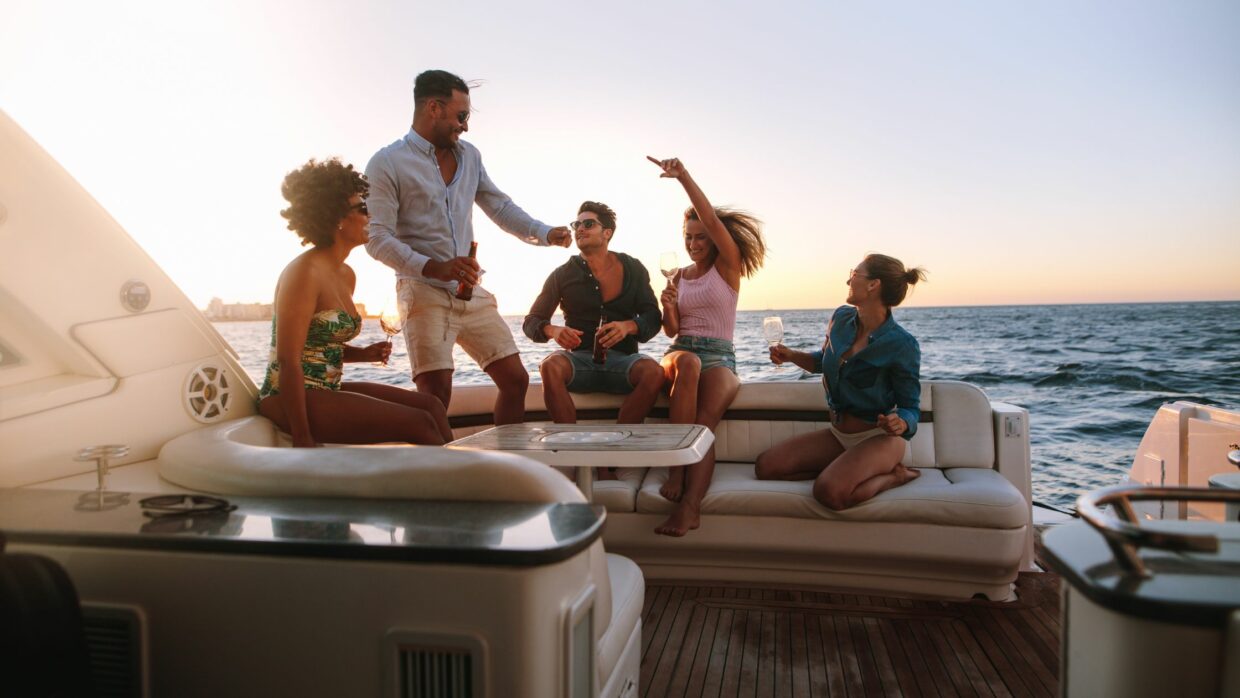Grilling outside is one of the best ways to spend a relaxing day on the water. A BBQ grill for boats can be either gas, charcoal, or electric, much like its land-based counterparts. Boatzon offers a number of models from well-known names in the marine grill industry available on its website.
Outdoors and waterside, freshly grilled food is at its best when prepared competently and safely. Below are some tips for cooking up some of the best waterborne barbecue around while taking appropriate precautions — because it’s bad enough to burn your ribs, but being negligent with a grill on a boat can lead to serious injury or even (in rare cases) sink the vessel.

Charcoal Grilling
Traditional cooking over charcoal has both benefits and drawbacks. Charcoal, which needs to be kept dry during transport, must be ignited and allowed to heat up before any cooking can take place. How much money you want to spend and how often you want to prepare food typically determine the type of grill you choose for your boat. The size of the boat is also important, since a bigger grill is useless if there’s no room for it. Grease and soot markings from a grill, when it’s not in use, can be avoided by utilizing one of the several storage bags available from various manufacturers.
Charcoal barbecue purists will tell you that nothing beats a steak or freshly caught fish grilled over charcoal, but keep in mind this isn’t a cooking technique for the impatient. Most grills — if not all — will include instructions on how to ignite them, and you should always follow these to the letter.
Small, spherical stainless steel grills that can be clamped onto a railing or, with an adapter, inserted into a rod holder are a favored choice for marine cooking. When using charcoal for grilling on a boat, the grill should be swung away from the vessel before you light it. If any hot ash escapes, it will then fall into the sea rather than onto the boat deck, where it could cause damage or even start a fire.
Charcoal is widely accessible, but it’s best to use the easy-to-light variety to avoid accidental spills and burns. Although charcoal grills are useful, the fuel they use needs to be kept dry, may be dirty if spilled, and takes up a lot of room in storage. Nonetheless, this type of grill’s low upfront cost is appealing, especially if you don’t anticipate using it very frequently.
Propane Grills
Gas (propane) grills designed for boats are now readily available and are the most common type used on boats since they eliminate a number of risks. Models range in size from those that can serve a gathering of 20 guests with ease to those that are portable, operate on disposable gas canisters, and cost less than $100.
Be aware that while propane grills don’t generate embers, they present their own unique dangers. Never use a gas grill over an open locker or companionway, since propane is heavier than air and can sink. As the gas leaks downward, it collects at its lowest possible location, where it could combine with other elements to create an explosion.
Still, it’s not hard to understand why propane is the fuel of choice for so many boats. For all except the biggest barbecues, propane fuel is inexpensive and commonly accessible, and small disposable bottles of the substance are easy to stow away. Smaller grills that use tiny disposable gas canisters can be purchased for under $200, making propane grills suitable for almost any boat and budget.
Electric Grills
An electric grill is an option if your boat has access to a steady supply of AC power from either shore power or a generator. In contrast to smaller gas- and charcoal-powered models, electric grills are often permanently installed inside a boat, either on the flybridge or in another designated place. Electric grills are more expensive than equivalent-sized gas grills, and they can use as much as 8 or 10 amps of power, meaning you’ll need to fire up a generator if you’re far from a dock. The absence of an open flame means that the grill can be used in locations where the use of charcoal or propane would normally be prohibited, such as a marina slip. Electric grills are also less dangerous to people than charcoal grills, since there’s no open flame that could burn someone.
The price of electric grills, like those of their propane-fired counterparts, can go through the roof for high-end varieties, but some plug-in electric models are portable, relatively cheap (under $200), and easy to store when not in use.
General Grilling Advice for Staying Safe
Here are some additional tips for grilling on the water:
1. Don’t cook while you’re sailing.
2. Never, ever, ever walk away from a lighted grill on board.
3. Charcoal grills on boats should never be lit using gasoline or any other unauthorized accelerant.
4. Make sure you know how to use the grill by reading and following the manual.
5. You should take precautions to prevent embers from the grill from landing anywhere on the boat.
6. For safety reasons, marinas often prohibit the use of open fires, including those in barbecue grills.
7. Before firing up your grill, make sure it’s OK with the marina personnel.
8. Ensure your gas tanks are securely fastened and have no leaks at all times.
9. If you smell a leak, use a soapy water solution to inspect the connections. When brushing over a joint, if bubbles appear, there’s a leak.
10. As soon as you’re done using your grill, turn it off, and let it cool to the touch before you put it away.
11. Before you set out on a voyage, make sure any portable grills are disconnected and stowed.
12. Grills that use open flames should be placed downwind and far aft of any sail coverings or biminis.




